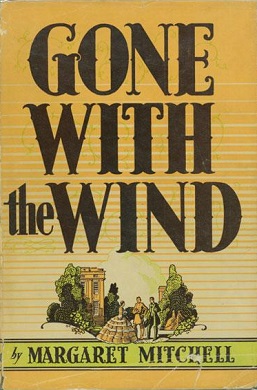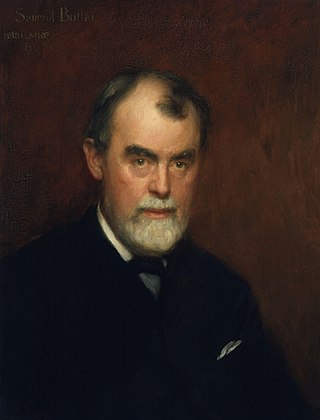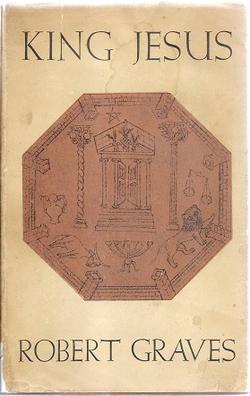
Tiberius Claudius Caesar Augustus Germanicus was the fourth Roman emperor, ruling from AD 41 to 54. A member of the Julio-Claudian dynasty, Claudius was born to Drusus and Antonia Minor at Lugdunum in Roman Gaul, where his father was stationed as a military legate. He was the first Roman emperor to be born outside Italy. Nonetheless, Claudius was an Italian of Sabine origins.

Erewhon: or, Over the Range is a novel by English writer Samuel Butler, first published anonymously in 1872, set in a fictional country discovered and explored by the protagonist. The book is a satire on Victorian society.

Gone with the Wind is a novel by American writer Margaret Mitchell, first published in 1936. The story is set in Clayton County and Atlanta, both in Georgia, during the American Civil War and Reconstruction Era. It depicts the struggles of young Scarlett O'Hara, the spoiled daughter of a well-to-do plantation owner, who must use every means at her disposal to claw her way out of poverty following Sherman's destructive "March to the Sea". This historical novel features a coming-of-age story, with the title taken from the poem "Non Sum Qualis eram Bonae Sub Regno Cynarae", written by Ernest Dowson.

The Tragedy of Hamlet, Prince of Denmark, often shortened to Hamlet, is a tragedy written by William Shakespeare sometime between 1599 and 1601. It is Shakespeare's longest play, with 29,551 words. Set in Denmark, the play depicts Prince Hamlet and his attempts to exact revenge against his uncle, Claudius, who has murdered Hamlet's father in order to seize his throne and marry Hamlet's mother.

Captain Robert von Ranke Graves was an English poet, historical novelist and critic. His father was Alfred Perceval Graves, a celebrated Irish poet and figure in the Gaelic revival; they were both Celticists and students of Irish mythology. Graves produced more than 140 works in his lifetime. His poems, his translations and innovative analysis of the Greek myths, his memoir of his early life—including his role in World War I—Good-Bye to All That, and his speculative study of poetic inspiration The White Goddess have never been out of print. He is also a renowned short story writer, with stories such as "The Tenement" still being popular today.

Valeria Messalina was the third wife of Roman emperor Claudius. She was a paternal cousin of Emperor Nero, a second cousin of Emperor Caligula, and a great-grandniece of Emperor Augustus. A powerful and influential woman with a reputation for promiscuity, she allegedly conspired against her husband and was executed on the discovery of the plot. Her notorious reputation probably resulted from political bias, but works of art and literature have perpetuated it into modern times.

Simone Lucie Ernestine Marie Bertrand de Beauvoir was a French existentialist philosopher, writer, social theorist, and feminist activist. Though she did not consider herself a philosopher, nor was she considered one at the time of her death, she had a significant influence on both feminist existentialism and feminist theory.

I, Claudius is a historical novel by English writer Robert Graves, published in 1934. Written in the form of an autobiography of the Roman Emperor Claudius, it tells the history of the Julio-Claudian dynasty and the early years of the Roman Empire, from Julius Caesar's assassination in 44 BC to Caligula's assassination in AD 41. Though the narrative is largely fictionalized, most of the events depicted are drawn from historical accounts of the same time period by the Roman historians Suetonius and Tacitus.

Laertes is a character in William Shakespeare's c. 1600 play Hamlet. Laertes is the son of Polonius and the brother of Ophelia. In the final scene, he mortally stabs Hamlet with a poison-tipped sword to avenge the deaths of his father and sister, for which he blamed Hamlet. While dying of the same poison, he implicates King Claudius.

Aeaea, Ææa or Eëä was a mythological island said to be the home of the goddess-sorceress Circe.
"Circe would fain have held me back in her halls, the guileful lady of Aeaea, yearning that I should be her husband"..

Harriet Stratemeyer Adams was an American juvenile book packager, children's novelist, and publisher who was responsible for some 200 books over her literary career. She wrote the plot outlines for many books in the Nancy Drew series, using characters invented by her father, Edward Stratemeyer. Adams also oversaw other ghostwriters who wrote for these and many other series as a part of the Stratemeyer Syndicate, and rewrote many of the novels to update them starting in the late 1950s.

Samuel Butler was an English novelist and critic, best known for the satirical utopian novel Erewhon (1872) and the semi-autobiographical novel The Way of All Flesh. Both novels have remained in print since their initial publication. In other studies he examined Christian orthodoxy, evolutionary thought, and Italian art, and made prose translations of the Iliad and Odyssey that are still consulted.

Julia Livia, was the daughter of Drusus Julius Caesar and Livilla, and granddaughter of the Roman Emperor Tiberius. She was also a first cousin of the emperor Caligula, and niece of the emperor Claudius.

Oisín, Osian, Ossian, or anglicized as Osheen was regarded in legend as the greatest poet of Ireland, a warrior of the Fianna in the Ossianic or Fenian Cycle of Irish mythology. He is the demigod son of Fionn mac Cumhaill and of Sadhbh, and is the narrator of much of the cycle and composition of the poems are attributed to him.

The Penelopiad is a novella by Canadian author Margaret Atwood. It was published in 2005 as part of the first set of books in the Canongate Myth Series where contemporary authors rewrite ancient myths. In The Penelopiad, Penelope reminisces on the events of the Odyssey, life in Hades, Odysseus, Helen of Troy, and her relationships with her parents. A Greek chorus of the twelve maids, who Odysseus believed were disloyal and whom Telemachus hanged, interrupt Penelope's narrative to express their view on events. The maids' interludes use a new genre each time, including a jump-rope rhyme, a lament, an idyll, a ballad, a lecture, a court trial and several types of songs.

Octavia the Younger was the elder sister of the first Roman Emperor, Augustus, the half-sister of Octavia the Elder, and the fourth wife of Mark Antony. She was also the great-grandmother of the Emperor Caligula and Empress Agrippina the Younger, maternal grandmother of the Emperor Claudius, and paternal great-grandmother and maternal great-great-grandmother of the Emperor Nero.

Cold Mountain is a 1997 historical novel by Charles Frazier which won the U.S. National Book Award for Fiction. It tells the story of W. P. Inman, a wounded deserter from the Confederate army near the end of the American Civil War who walks for months to return to Ada Monroe, the love of his life; the story shares several similarities with Homer's Odyssey. The narrative alternates back and forth every chapter between the stories of Inman and Ada, a minister's daughter recently relocated from Charleston to a farm in a rural mountain community near Cold Mountain, North Carolina from which Inman hails. Though they only knew each other for a brief time before Inman departed for the war, it is largely the hope of seeing Ada again that drives Inman to desert the army and make the dangerous journey back to Cold Mountain. Details of their brief history together are told at intervals in flashback over the course of the novel.

King Jesus is a semi-historical novel by Robert Graves, first published in 1946. The novel treats the historical Jesus not as the Son of God, but rather as a philosopher with a legitimate claim to the Judaean throne through Herod the Great, as well as the Davidic monarchy; and treats numerous Biblical stories in a non-religious manner.
Rediscovering Homer is a 2006 book by Andrew Dalby. It sets out the problems of origin, dating and authorship of the two ancient Greek epics, Iliad and Odyssey, usually attributed to Homer.

The Beekeeper's Apprentice, Or On the Segregation of the Queen is the first book in the Mary Russell series by Laurie R. King. It was nominated for the Agatha best novel award and was deemed a Notable Young Adult book by the American Library Association.



















